Analysis of Leadership in Business Economics Assignment: Saudi Economy
VerifiedAdded on 2022/11/22
|7
|1318
|391
Report
AI Summary
This report provides a critical analysis of an assignment that examines the challenges and opportunities associated with Saudi Arabia's transition from an oil-based economy to a knowledge-based economy. The assignment analyzes an article discussing the key aspects influencing this transition, including human capital, innovation, information and communication technology (ICT), and education. The report critiques the article's approach, highlighting its descriptive nature and reliance on secondary sources. It evaluates the article's assessment of human capital, innovation, unemployment, and telecommunications, providing contrasting viewpoints and empirical evidence. The analysis underscores the importance of a clear government plan, strategic sequencing of initiatives, and a comprehensive approach to address the multifaceted challenges. The report emphasizes the interconnectedness of factors like education and employment and the need for a holistic strategy rather than isolated interventions to facilitate a successful economic transformation.
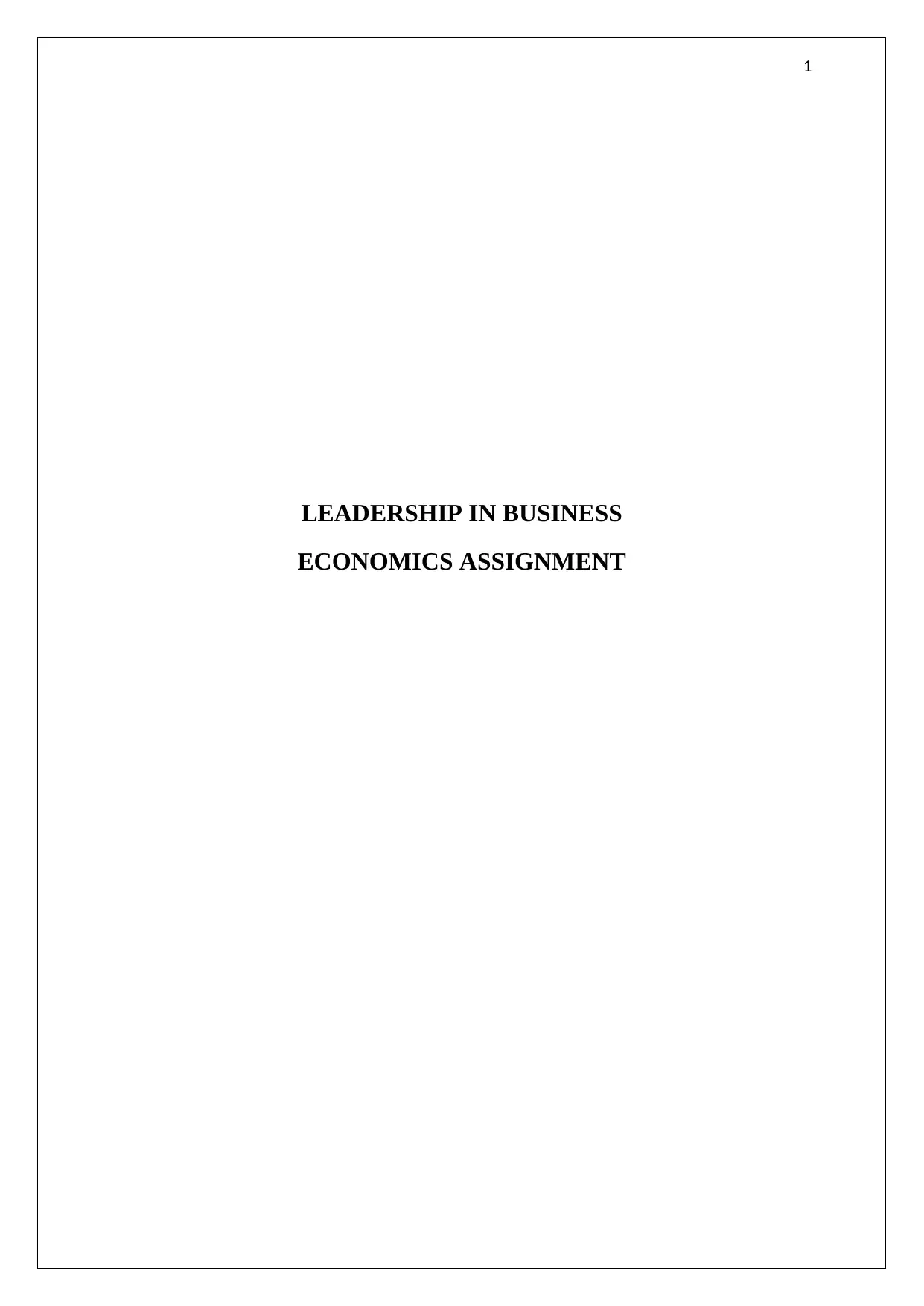
1
LEADERSHIP IN BUSINESS
ECONOMICS ASSIGNMENT
LEADERSHIP IN BUSINESS
ECONOMICS ASSIGNMENT
Paraphrase This Document
Need a fresh take? Get an instant paraphrase of this document with our AI Paraphraser
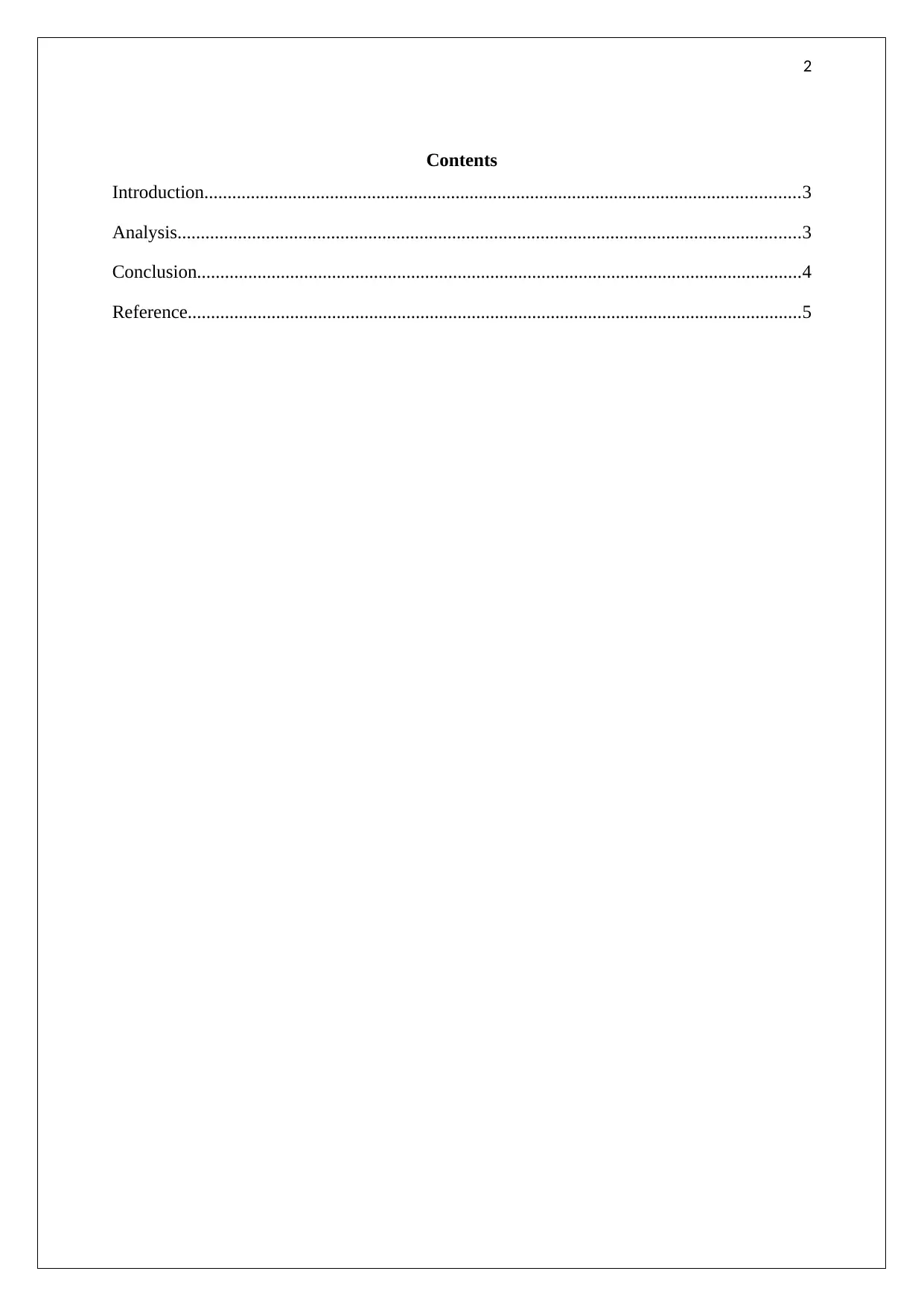
2
Contents
Introduction................................................................................................................................3
Analysis......................................................................................................................................3
Conclusion..................................................................................................................................4
Reference....................................................................................................................................5
Contents
Introduction................................................................................................................................3
Analysis......................................................................................................................................3
Conclusion..................................................................................................................................4
Reference....................................................................................................................................5
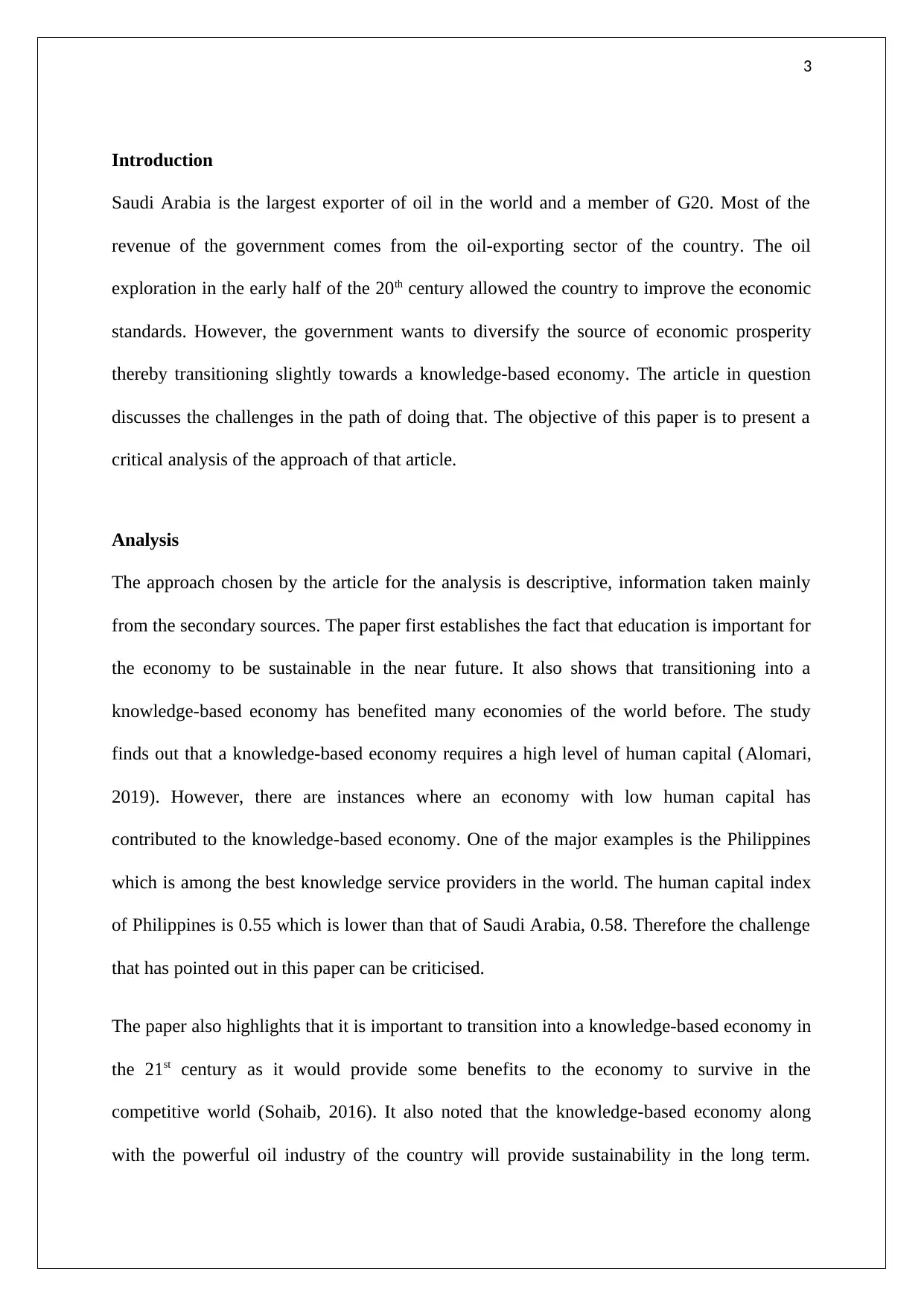
3
Introduction
Saudi Arabia is the largest exporter of oil in the world and a member of G20. Most of the
revenue of the government comes from the oil-exporting sector of the country. The oil
exploration in the early half of the 20th century allowed the country to improve the economic
standards. However, the government wants to diversify the source of economic prosperity
thereby transitioning slightly towards a knowledge-based economy. The article in question
discusses the challenges in the path of doing that. The objective of this paper is to present a
critical analysis of the approach of that article.
Analysis
The approach chosen by the article for the analysis is descriptive, information taken mainly
from the secondary sources. The paper first establishes the fact that education is important for
the economy to be sustainable in the near future. It also shows that transitioning into a
knowledge-based economy has benefited many economies of the world before. The study
finds out that a knowledge-based economy requires a high level of human capital (Alomari,
2019). However, there are instances where an economy with low human capital has
contributed to the knowledge-based economy. One of the major examples is the Philippines
which is among the best knowledge service providers in the world. The human capital index
of Philippines is 0.55 which is lower than that of Saudi Arabia, 0.58. Therefore the challenge
that has pointed out in this paper can be criticised.
The paper also highlights that it is important to transition into a knowledge-based economy in
the 21st century as it would provide some benefits to the economy to survive in the
competitive world (Sohaib, 2016). It also noted that the knowledge-based economy along
with the powerful oil industry of the country will provide sustainability in the long term.
Introduction
Saudi Arabia is the largest exporter of oil in the world and a member of G20. Most of the
revenue of the government comes from the oil-exporting sector of the country. The oil
exploration in the early half of the 20th century allowed the country to improve the economic
standards. However, the government wants to diversify the source of economic prosperity
thereby transitioning slightly towards a knowledge-based economy. The article in question
discusses the challenges in the path of doing that. The objective of this paper is to present a
critical analysis of the approach of that article.
Analysis
The approach chosen by the article for the analysis is descriptive, information taken mainly
from the secondary sources. The paper first establishes the fact that education is important for
the economy to be sustainable in the near future. It also shows that transitioning into a
knowledge-based economy has benefited many economies of the world before. The study
finds out that a knowledge-based economy requires a high level of human capital (Alomari,
2019). However, there are instances where an economy with low human capital has
contributed to the knowledge-based economy. One of the major examples is the Philippines
which is among the best knowledge service providers in the world. The human capital index
of Philippines is 0.55 which is lower than that of Saudi Arabia, 0.58. Therefore the challenge
that has pointed out in this paper can be criticised.
The paper also highlights that it is important to transition into a knowledge-based economy in
the 21st century as it would provide some benefits to the economy to survive in the
competitive world (Sohaib, 2016). It also noted that the knowledge-based economy along
with the powerful oil industry of the country will provide sustainability in the long term.
⊘ This is a preview!⊘
Do you want full access?
Subscribe today to unlock all pages.

Trusted by 1+ million students worldwide
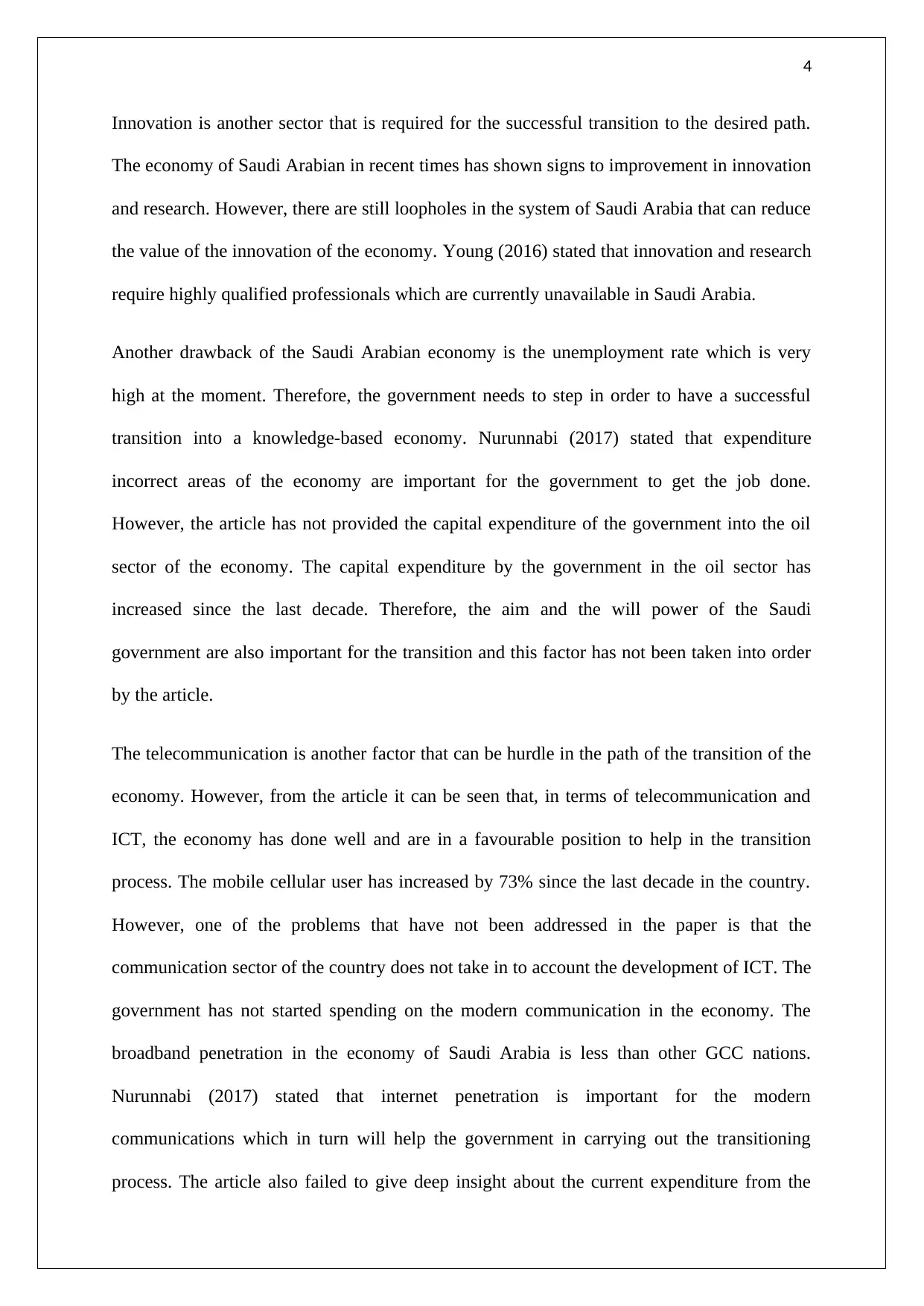
4
Innovation is another sector that is required for the successful transition to the desired path.
The economy of Saudi Arabian in recent times has shown signs to improvement in innovation
and research. However, there are still loopholes in the system of Saudi Arabia that can reduce
the value of the innovation of the economy. Young (2016) stated that innovation and research
require highly qualified professionals which are currently unavailable in Saudi Arabia.
Another drawback of the Saudi Arabian economy is the unemployment rate which is very
high at the moment. Therefore, the government needs to step in order to have a successful
transition into a knowledge-based economy. Nurunnabi (2017) stated that expenditure
incorrect areas of the economy are important for the government to get the job done.
However, the article has not provided the capital expenditure of the government into the oil
sector of the economy. The capital expenditure by the government in the oil sector has
increased since the last decade. Therefore, the aim and the will power of the Saudi
government are also important for the transition and this factor has not been taken into order
by the article.
The telecommunication is another factor that can be hurdle in the path of the transition of the
economy. However, from the article it can be seen that, in terms of telecommunication and
ICT, the economy has done well and are in a favourable position to help in the transition
process. The mobile cellular user has increased by 73% since the last decade in the country.
However, one of the problems that have not been addressed in the paper is that the
communication sector of the country does not take in to account the development of ICT. The
government has not started spending on the modern communication in the economy. The
broadband penetration in the economy of Saudi Arabia is less than other GCC nations.
Nurunnabi (2017) stated that internet penetration is important for the modern
communications which in turn will help the government in carrying out the transitioning
process. The article also failed to give deep insight about the current expenditure from the
Innovation is another sector that is required for the successful transition to the desired path.
The economy of Saudi Arabian in recent times has shown signs to improvement in innovation
and research. However, there are still loopholes in the system of Saudi Arabia that can reduce
the value of the innovation of the economy. Young (2016) stated that innovation and research
require highly qualified professionals which are currently unavailable in Saudi Arabia.
Another drawback of the Saudi Arabian economy is the unemployment rate which is very
high at the moment. Therefore, the government needs to step in order to have a successful
transition into a knowledge-based economy. Nurunnabi (2017) stated that expenditure
incorrect areas of the economy are important for the government to get the job done.
However, the article has not provided the capital expenditure of the government into the oil
sector of the economy. The capital expenditure by the government in the oil sector has
increased since the last decade. Therefore, the aim and the will power of the Saudi
government are also important for the transition and this factor has not been taken into order
by the article.
The telecommunication is another factor that can be hurdle in the path of the transition of the
economy. However, from the article it can be seen that, in terms of telecommunication and
ICT, the economy has done well and are in a favourable position to help in the transition
process. The mobile cellular user has increased by 73% since the last decade in the country.
However, one of the problems that have not been addressed in the paper is that the
communication sector of the country does not take in to account the development of ICT. The
government has not started spending on the modern communication in the economy. The
broadband penetration in the economy of Saudi Arabia is less than other GCC nations.
Nurunnabi (2017) stated that internet penetration is important for the modern
communications which in turn will help the government in carrying out the transitioning
process. The article also failed to give deep insight about the current expenditure from the
Paraphrase This Document
Need a fresh take? Get an instant paraphrase of this document with our AI Paraphraser
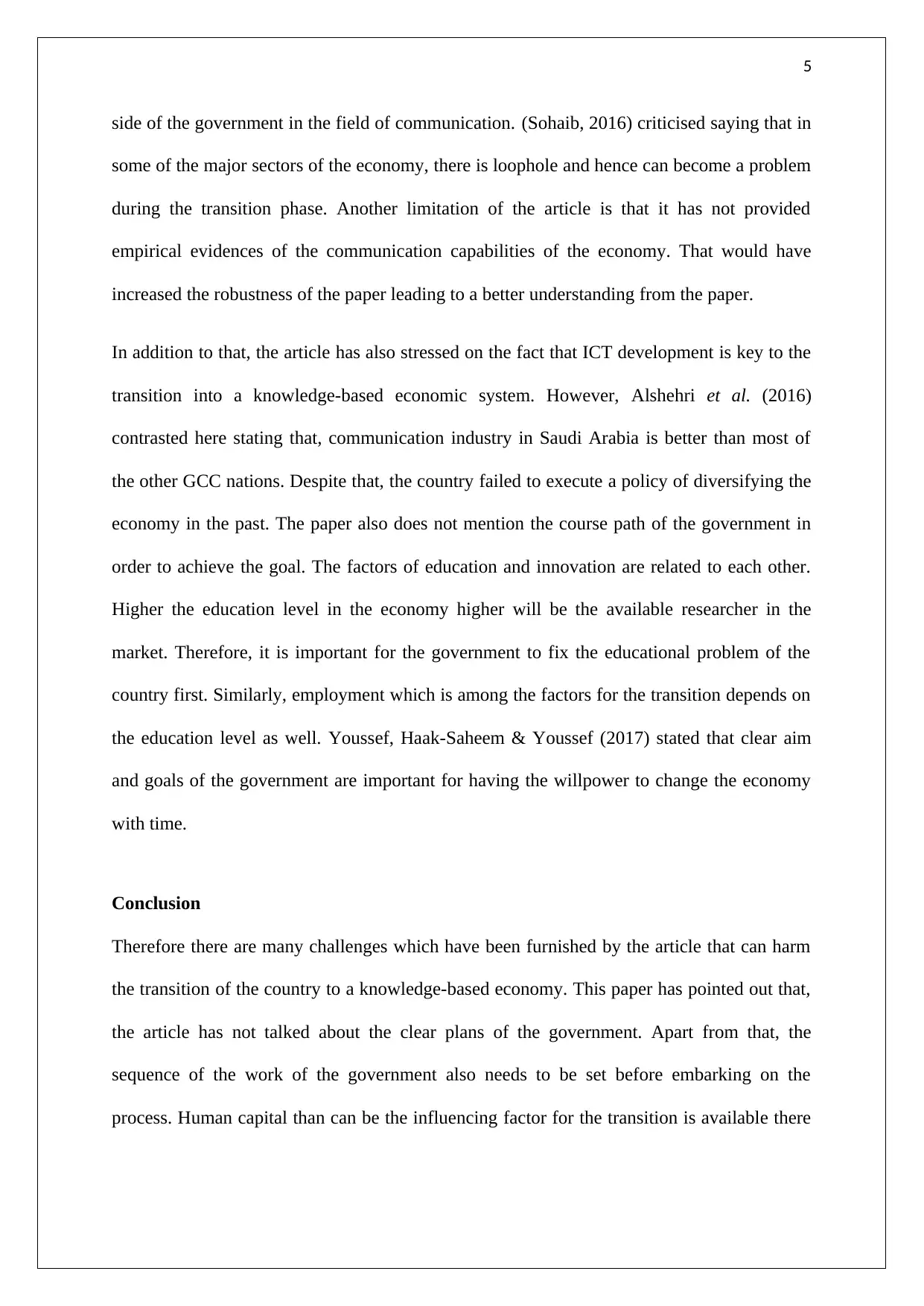
5
side of the government in the field of communication. (Sohaib, 2016) criticised saying that in
some of the major sectors of the economy, there is loophole and hence can become a problem
during the transition phase. Another limitation of the article is that it has not provided
empirical evidences of the communication capabilities of the economy. That would have
increased the robustness of the paper leading to a better understanding from the paper.
In addition to that, the article has also stressed on the fact that ICT development is key to the
transition into a knowledge-based economic system. However, Alshehri et al. (2016)
contrasted here stating that, communication industry in Saudi Arabia is better than most of
the other GCC nations. Despite that, the country failed to execute a policy of diversifying the
economy in the past. The paper also does not mention the course path of the government in
order to achieve the goal. The factors of education and innovation are related to each other.
Higher the education level in the economy higher will be the available researcher in the
market. Therefore, it is important for the government to fix the educational problem of the
country first. Similarly, employment which is among the factors for the transition depends on
the education level as well. Youssef, Haak-Saheem & Youssef (2017) stated that clear aim
and goals of the government are important for having the willpower to change the economy
with time.
Conclusion
Therefore there are many challenges which have been furnished by the article that can harm
the transition of the country to a knowledge-based economy. This paper has pointed out that,
the article has not talked about the clear plans of the government. Apart from that, the
sequence of the work of the government also needs to be set before embarking on the
process. Human capital than can be the influencing factor for the transition is available there
side of the government in the field of communication. (Sohaib, 2016) criticised saying that in
some of the major sectors of the economy, there is loophole and hence can become a problem
during the transition phase. Another limitation of the article is that it has not provided
empirical evidences of the communication capabilities of the economy. That would have
increased the robustness of the paper leading to a better understanding from the paper.
In addition to that, the article has also stressed on the fact that ICT development is key to the
transition into a knowledge-based economic system. However, Alshehri et al. (2016)
contrasted here stating that, communication industry in Saudi Arabia is better than most of
the other GCC nations. Despite that, the country failed to execute a policy of diversifying the
economy in the past. The paper also does not mention the course path of the government in
order to achieve the goal. The factors of education and innovation are related to each other.
Higher the education level in the economy higher will be the available researcher in the
market. Therefore, it is important for the government to fix the educational problem of the
country first. Similarly, employment which is among the factors for the transition depends on
the education level as well. Youssef, Haak-Saheem & Youssef (2017) stated that clear aim
and goals of the government are important for having the willpower to change the economy
with time.
Conclusion
Therefore there are many challenges which have been furnished by the article that can harm
the transition of the country to a knowledge-based economy. This paper has pointed out that,
the article has not talked about the clear plans of the government. Apart from that, the
sequence of the work of the government also needs to be set before embarking on the
process. Human capital than can be the influencing factor for the transition is available there
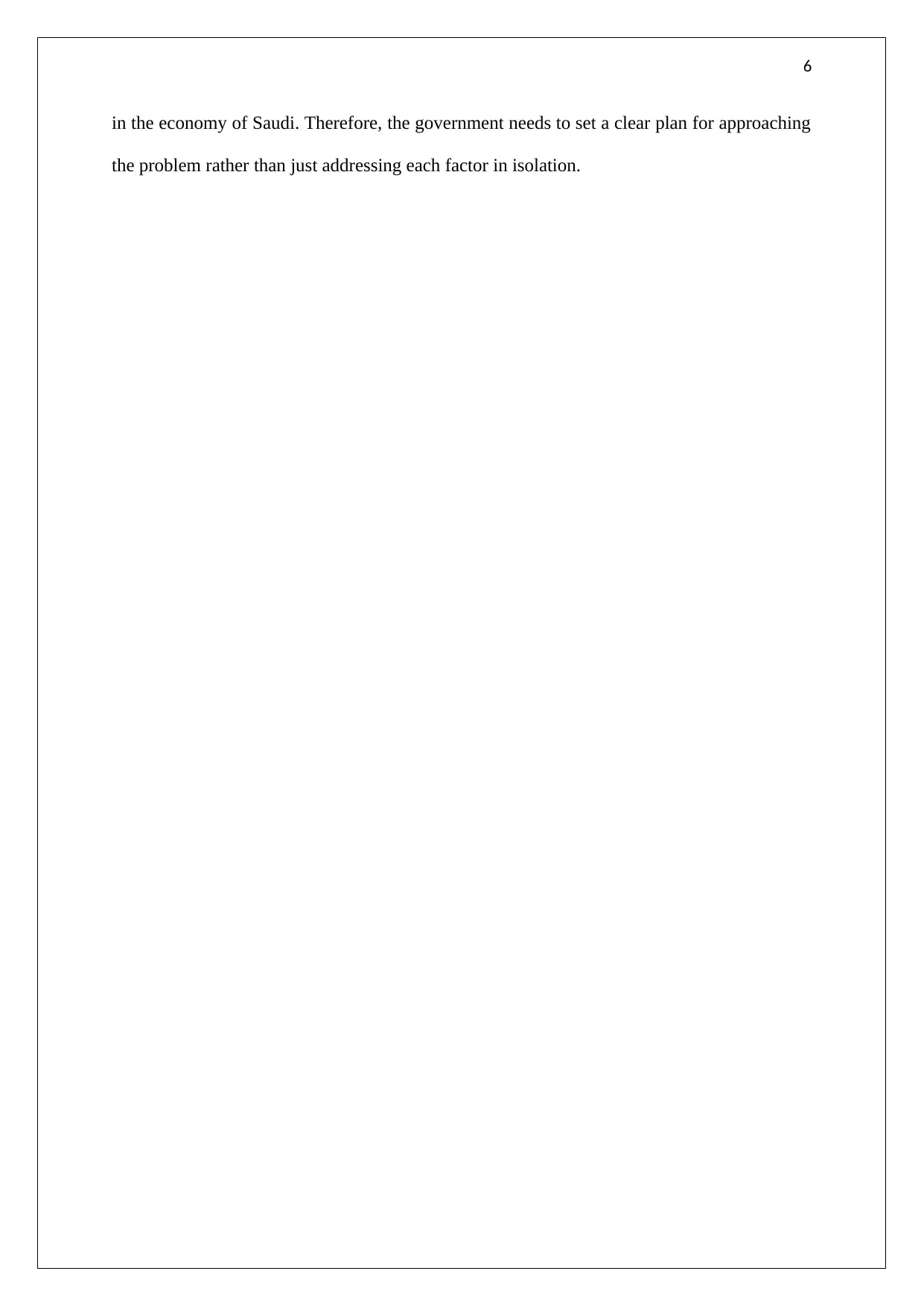
6
in the economy of Saudi. Therefore, the government needs to set a clear plan for approaching
the problem rather than just addressing each factor in isolation.
in the economy of Saudi. Therefore, the government needs to set a clear plan for approaching
the problem rather than just addressing each factor in isolation.
⊘ This is a preview!⊘
Do you want full access?
Subscribe today to unlock all pages.

Trusted by 1+ million students worldwide
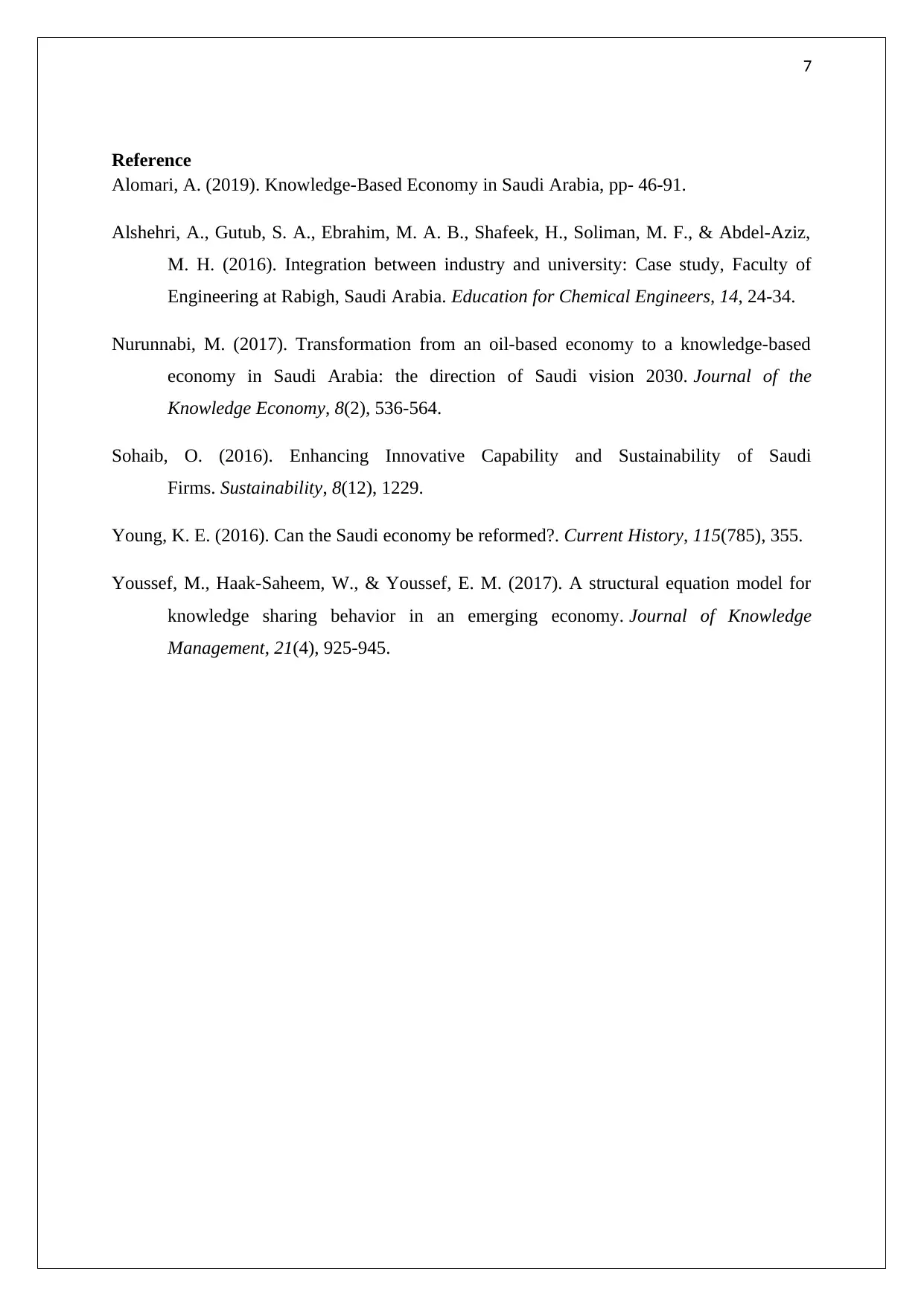
7
Reference
Alomari, A. (2019). Knowledge-Based Economy in Saudi Arabia, pp- 46-91.
Alshehri, A., Gutub, S. A., Ebrahim, M. A. B., Shafeek, H., Soliman, M. F., & Abdel-Aziz,
M. H. (2016). Integration between industry and university: Case study, Faculty of
Engineering at Rabigh, Saudi Arabia. Education for Chemical Engineers, 14, 24-34.
Nurunnabi, M. (2017). Transformation from an oil-based economy to a knowledge-based
economy in Saudi Arabia: the direction of Saudi vision 2030. Journal of the
Knowledge Economy, 8(2), 536-564.
Sohaib, O. (2016). Enhancing Innovative Capability and Sustainability of Saudi
Firms. Sustainability, 8(12), 1229.
Young, K. E. (2016). Can the Saudi economy be reformed?. Current History, 115(785), 355.
Youssef, M., Haak-Saheem, W., & Youssef, E. M. (2017). A structural equation model for
knowledge sharing behavior in an emerging economy. Journal of Knowledge
Management, 21(4), 925-945.
Reference
Alomari, A. (2019). Knowledge-Based Economy in Saudi Arabia, pp- 46-91.
Alshehri, A., Gutub, S. A., Ebrahim, M. A. B., Shafeek, H., Soliman, M. F., & Abdel-Aziz,
M. H. (2016). Integration between industry and university: Case study, Faculty of
Engineering at Rabigh, Saudi Arabia. Education for Chemical Engineers, 14, 24-34.
Nurunnabi, M. (2017). Transformation from an oil-based economy to a knowledge-based
economy in Saudi Arabia: the direction of Saudi vision 2030. Journal of the
Knowledge Economy, 8(2), 536-564.
Sohaib, O. (2016). Enhancing Innovative Capability and Sustainability of Saudi
Firms. Sustainability, 8(12), 1229.
Young, K. E. (2016). Can the Saudi economy be reformed?. Current History, 115(785), 355.
Youssef, M., Haak-Saheem, W., & Youssef, E. M. (2017). A structural equation model for
knowledge sharing behavior in an emerging economy. Journal of Knowledge
Management, 21(4), 925-945.
1 out of 7
Related Documents
Your All-in-One AI-Powered Toolkit for Academic Success.
+13062052269
info@desklib.com
Available 24*7 on WhatsApp / Email
![[object Object]](/_next/static/media/star-bottom.7253800d.svg)
Unlock your academic potential
Copyright © 2020–2026 A2Z Services. All Rights Reserved. Developed and managed by ZUCOL.





